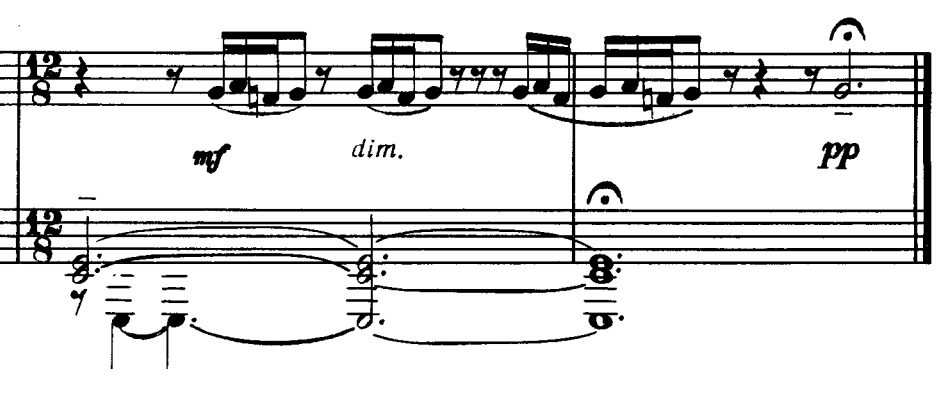In between practicing for my piano lesson today, I listened through the collection of Rachmaninoff Preludes and Etudes-Tableaux that was in the picture on my Instagram yesterday.
I found a recording on Spotify of Vladimir Ashkenazy playing all of Rachmaninoff's piano works, and I used that as the basis. The score was the Dover edition of the complete preludes and etudes-tableaux.
I've never spent much time on Rachmaninoff. Before today, my familiarity with his work was limited to the knowledge that he was a late romantic/early modern Russian virtuoso pianist and composer, and that he had large hands (as made fun of here, but seriously the story is that he could reach a 13th).
I had a passing familiarity with the Prelude in G minor (Op. 23, No. 5) because I believe I worked on it briefly in college.
Because of that, and because his second piano concerto is widely regarded as one of the most demanding pieces of piano literature, I had this idea that most everything was going to be big chords and bombast. I figured that dense chords would be all over the place.
I was not surprised, therefore, to see a stretch of physically unplayable chords (by any normal person anyway) at the end of the first prelude (Op. 23, No. 1 in F Sharp Minor)
Those left hand chords are virtually impossible to reach with a normal hand span.
I spent a few moments trying to sort out how one might play those so in order to get the majority of notes to sound, but also to maintain the feeling of single, blocked chords (my initial impulse would be to break up the chord, but that changes the feeling entirely).
Overall, I wasn't terribly impressed with the Op. 23 etudes though. They were virtuosic and challenging, but seemed somehow empty too. There wasn't a strong sense of artistic identity somehow.
Moving on to Op. 32, though, was markedly different. My favorite piece that I listened to the of the whole day was Op. 32, No. 3. I can't say why now, but I know I made a note to that effect when I was writing down spur of the moment notes. I went back to listen again, but it didn't strike me quite the same, though I did still enjoy it more than those around it.
I listened to these in opus order, which means chronologically. I discovered after the fact that I missed the Prelude in C-sharp minor, which was written and published ahead of time:
- Ten Preludes, Op. 23 (1901-1903)
- Thirteen Preludes, Op. 32 (1910)
- Eight Etudes-Tableaux, Op. 33 (1911)
- Nine Etudes-Tabluex, Op. 39 (1916-1917)
There is definitely a growing sense of command of the piano as the pieces progress. Notwithstanding the increased complexity of the Etudes-Tableaux compared to the Preludes, they simply feel more natural somehow.
I didn't dig into the analysis of these pieces enough to add anything lengthy here, but here's some trivia about the Etudes-Tableaux: The original set of 8 contained 9, but the work in A minor was removed. It was later rewritten and added into the second set.
The use of the word "tableaux" implies that there are not only technical challenges, but images inspiring these works. Rachmaninoff did not put titles at the beginnings of the pieces, but when Ottorino Respighi orchestrated them, Rachmaninoff gave him some guidance, so the orchestrated versions do have titles.
I'll conclude this post with a few random thoughts.
First, on the performance. Rubato is technique that involves slight variations in tempo for expressive purposes. It's less employed now than it would have been during Rachmaninoff's day, but there's plenty to be found in these performances. Many of the tempo swings are practical in nature, allowing the pianist to get from one end of the keyboard to another, or for a large chord to diminish enough for the rapid moving notes after it to be heard.
But sometimes I get annoyed by the fact that this distorts the sense of meter in the piece. In rhapsodic pieces such a these, it's not so important, but it's a pet peeve of mine.
Finally, and in a very weird twist, there's a moment right at the end of Etude-Tableau Op. 33 No. 5 that must have inspired a melody in "Pink Elephants on Parade" from "Dumbo"
From Etude-Tableaux Op. 33, No. 5. Both hands are in bass clef.
Try playing the upper staff of this and see if you don't immediately sing "What'll I do?/What'll I do?/What an unusual view"!
Overall I'm glad I listened to these and I really enjoyed the experience. I highly recommend them.




